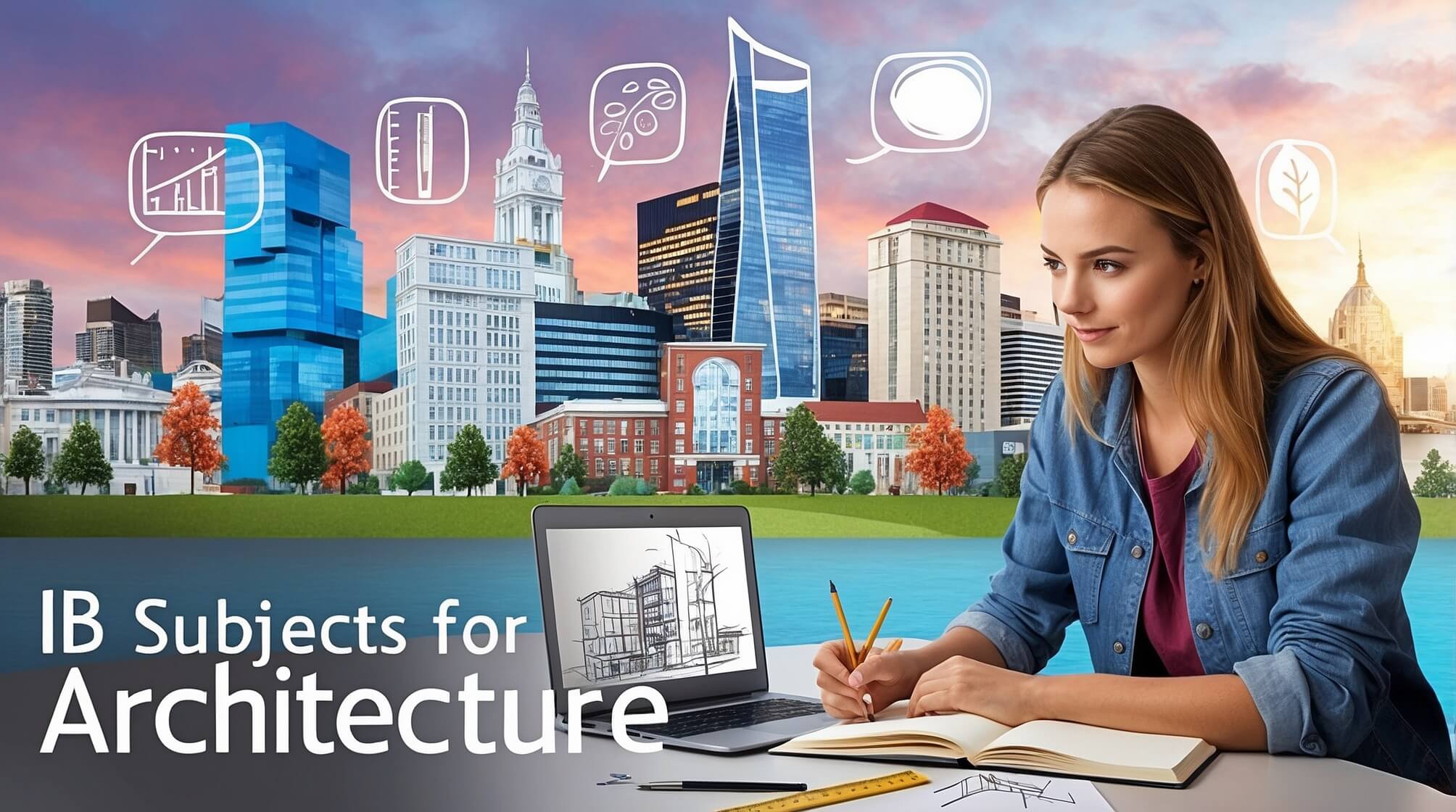IB Subjects for Architecture: A Guide for Aspiring Architects

This guide provides an overview of essential IB subjects for students interested in pursuing a career in architecture. It highlights core subjects such as Visual Arts, Mathematics, and Physics, along with additional courses like Design Technology and Geography. IB subjects focus on critical thinking, creativity, and practical problem-solving, all of which are essential for aspiring architects. Here’s an overview of the key IB subjects that support a future in architecture.
Understanding IB Subjects for Architecture
Aims of the Course
IB subjects for architecture aim to provide a strong foundation in design, mathematics, and science while encouraging creativity and innovation. The curriculum helps students develop technical skills, an appreciation for aesthetics, and an understanding of how architecture interacts with the environment. By studying architecture-related subjects in the IB, students prepare themselves for advanced studies in architecture, engineering, or design.
Core IB Subjects for Architecture
Visual Arts
The subject of Visual Arts is an important part in the training of students in the field of architecture because it develops not only the creativity but also the designing capabilities of the students. Students learn to communicate their ideas visually through a series of sketches, drawings, and models. They are allowed to research the different media and techniques that best convey architectural ideas. Moreover, Visual Arts develops critical thinking about aesthetics and cultural influence, thereby allowing them to develop a personal style applicable to architectural designs.
Mathematics
Mathematics is essential for architecture, especially in understanding spatial relationships, measurements, and structural calculations. The IB Mathematics: Analysis and Approaches or Mathematics: Applications and Interpretation courses provide students with the skills to solve complex problems related to geometry, calculus, and trigonometry. These mathematical concepts are fundamental when creating building designs and ensuring structural stability.
Physics
Another crucial subject for those studying architecture is physics. The concepts of forces, energy, and materials are taught, all of which are essential to comprehending the structural elements of buildings. Students can better understand how buildings stand, how energy is controlled, and how materials behave under various conditions by studying topics like mechanics, thermodynamics, and electromagnetic. Designing secure and effective structures requires an understanding of these concepts.
Additional IB Subjects Supporting Architecture
Design Technology
Design Technology is particularly relevant for architecture as it focuses on problem-solving through design and engineering. Students learn to apply creative thinking to real-world challenges, developing solutions that are both functional and aesthetically pleasing. The course covers areas such as sustainable design, material properties, and production techniques, which are valuable for architects who aim to create innovative and eco-friendly buildings.
Geography
Geography is a useful subject for students interested in architecture, particularly in terms of understanding the environment and urban planning. The IB Geography course covers topics such as human settlement, urban development, and sustainability. This helps students learn how buildings interact with their surroundings, including the social, environmental, and economic factors that influence design decisions.
Environmental Systems and Societies (ESS)
For students interested in sustainable architecture, Environmental Systems and Societies (ESS) provides valuable insights into how architecture impacts the environment. The course combines elements of biology, chemistry, and geography, helping students understand topics such as resource management, environmental degradation, and sustainable development. ESS encourages future architects to design buildings that are eco-friendly and responsive to the needs of the planet.
Creative and Practical Skills in IB Architecture Subjects
Model Making and Prototyping
Many of the IB subjects that support architecture, such as Visual Arts and Design Technology, involve practical activities like model making and prototyping. These skills are essential for architects, allowing them to turn conceptual designs into physical representations. By working with different materials and techniques, students learn how to communicate their ideas and test the feasibility of their designs.
Critical Thinking and Problem-Solving
Architecture is a field that requires innovative thinking and the ability to solve complex problems. IB subjects like Mathematics, Physics, and Design Technology challenge students to approach problems analytically and creatively. Whether designing a structure that can withstand environmental forces or creating a building that blends with its natural surroundings, critical thinking is at the heart of architectural design.
Ethical and Global Perspectives in Architecture
Sustainability and the Environment
Sustainability is a major consideration in modern architecture. The IB curriculum encourages students to think about the environmental impact of their designs and how they can create eco-friendly solutions. Subjects like Environmental Systems and Societies and Geography help students understand the importance of sustainable materials, energy-efficient designs, and reducing the carbon footprint of buildings.
Cultural Awareness in Architecture
Architecture has a strong influence on culture and history. In fact, it’s interconnected. The IB curriculum promotes global awareness, helping students understand how architecture varies across different cultures and societies. Courses like Visual Arts and Geography encourage students to explore how cultural heritage, traditions, and social norms influence architectural styles and practices. This awareness is vital for creating designs that are culturally sensitive and inclusive.
Preparing for a Future in Architecture
Portfolio Development
Building a strong portfolio to apply to architecture schools or seeking careers in design is essential. IB subjects like Visual Arts and Design Technology enable them to build a portfolio displaying their creativity, technical skills, and design abilities. Projects, sketches, and models created during these courses can be used to demonstrate a student's potential as an architect.
University Preparation
The IB Diploma Programme prepares students for the rigours of university-level study, particularly in architecture-related fields. With a focus on critical thinking, research, and practical application, IB students develop the skills needed to succeed in architecture programmes. By completing a combination of subjects in the sciences, mathematics, and the arts, students are well-equipped for the multidisciplinary nature of architectural studies.
Conclusion: Why Study Architecture in the IB?
The IB offers a comprehensive and balanced approach to studying architecture, combining creativity with technical skills and ethical awareness. Core subjects like Visual Arts, Mathematics, and Physics provide the essential knowledge needed to design and build structures, while additional courses like Design Technology and Geography offer valuable support. By focusing on sustainability, cultural awareness, and practical problem-solving, IB students are well-prepared to pursue a future in architecture. Whether designing eco-friendly homes or iconic urban landmarks, IB subjects give aspiring architects the tools and knowledge they need to make their visions a reality.
In Bangalore, Knowledgeum Academy stands out as one of the best IB schools in Bangalore offering the IB Diploma Programme, providing students with a rigorous and supportive environment that fosters academic excellence and personal growth.




